The Assault on Facts: How Misinformation and External Forces Threaten Journalism in Nigerian
“In the digital era, the democratization of information has empowered millions worldwide, breaking down traditional barriers to access and sharing. Digital platforms have further amplified this freedom, allowing users to personalize and engage with content on an unprecedented scale. This shift has challenged the dominance of conventional news media, reducing their vulnerability to censorship and manipulation by oppressive regimes and special interests.
However, the unchecked proliferation of digital content has also enabled the spread of misinformation, disinformation, propaganda, and conspiracy theories on a massive scale. The rise of Artificial Intelligence (AI) and chatbots has exponentially increased the reach and influence of these harmful narratives, posing significant threats to informed decision-making, social cohesion, and democratic values.
As we navigate this complex landscape, it’s essential to recognize the critical role of responsible journalism in combating the erosion of truth and promoting a well-informed public discourse. By embracing innovative storytelling formats, fact-checking initiatives, and collaborative reporting efforts, the news media can reclaim its role as a trusted guardian of fact-based information and a champion of democratic accountability.”
By Collins Odigie Ojiehanor
In Nigeria, the media’s fundamental role in shaping public perception and policy is under unprecedented strain. As societal divisions deepen and external pressures mount, journalists find themselves navigating a complex landscape where identity, bias, and funding intersect with the quest for truth. This intricate web of influences challenges the integrity of journalism and calls for a renewed commitment to the principles of truth and integrity in reporting.
The Power and Burden of Language
Speaking at the 2024 Wọle Ṣoyinka Centre Media Lecture Series on the theme “The Death of Truth? Realism, Literature and Journalism in an Age of Disinformation: A Symposium in Honour of Wọle Ṣoyinka,” Odia Ofeimun, poet, author and political scientist articulated the profound impact of language on our understanding of reality. Reflecting on the transformative power of language in defining and preserving narratives, Ofeimun stated, “We are required to forget what we knew of the interpreters who died into a season of harm and potentially disappear.” In a world scarred by conflict and disillusionment, language becomes a tool for continuity and coherence.
Ofeimun elaborated, “We entered what appeared to be a new world . . . only the power of language would give us a sense of pressure against treaties of unknown defeat.” His words highlight how language not only reflects but also shapes our collective experiences and memories, forging a sense of identity and belonging amidst turmoil.
Drawing a parallel to Professor Wole Soyinka’s literary legacy, Ofeimun noted, “With a Nobel Prize for literature long gone by his belt, we see what a glorious work he has made of his heart and serial image.” Soyinka’s work exemplifies how literature can anchor us to our past while guiding us through present challenges, underscoring the enduring relevance of storytelling in understanding our social fabric.
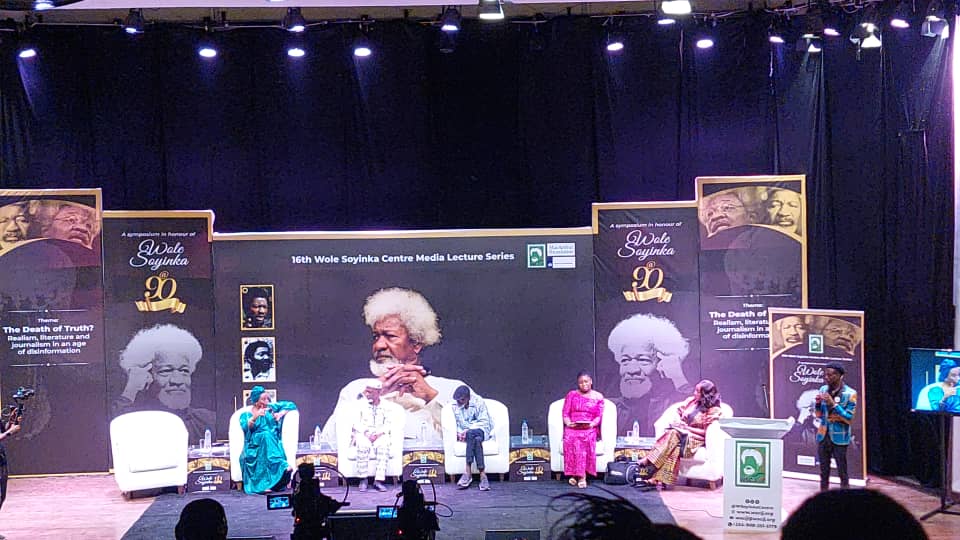
The Shift from Imaginative to Discursive Creativity
Ofeimun pointed out, “What was supposed to follow was a movement away from imaginative literature to what Roland Barthes and Foucault regarded as discursive creatives.” This transition signifies a departure from traditional literary forms towards a more fluid and interactive engagement with reality.
Barthes and Foucault’s theories advocate for a reimagining of the role of authors and creators in shaping reality. “The idea of the death of the author already said that Western literature had overproduced, and that the only thing that was left was not to produce more literature because originality was not possible,” Ofeimun explained.
This shift towards discursive creativity challenges the notion of originality, emphasizing instead the importance of revising and reinterpreting existing narratives. “You cannot throw away yesterday’s memory and hope that tomorrow’s memory will recreate today’s own,” he warned. This statement underscores the necessity of acknowledging and preserving historical memory as a foundation for understanding contemporary issues. Ofeimun argued that escaping reality through imaginative constructs alone is insufficient; true understanding requires confronting and integrating past experiences.
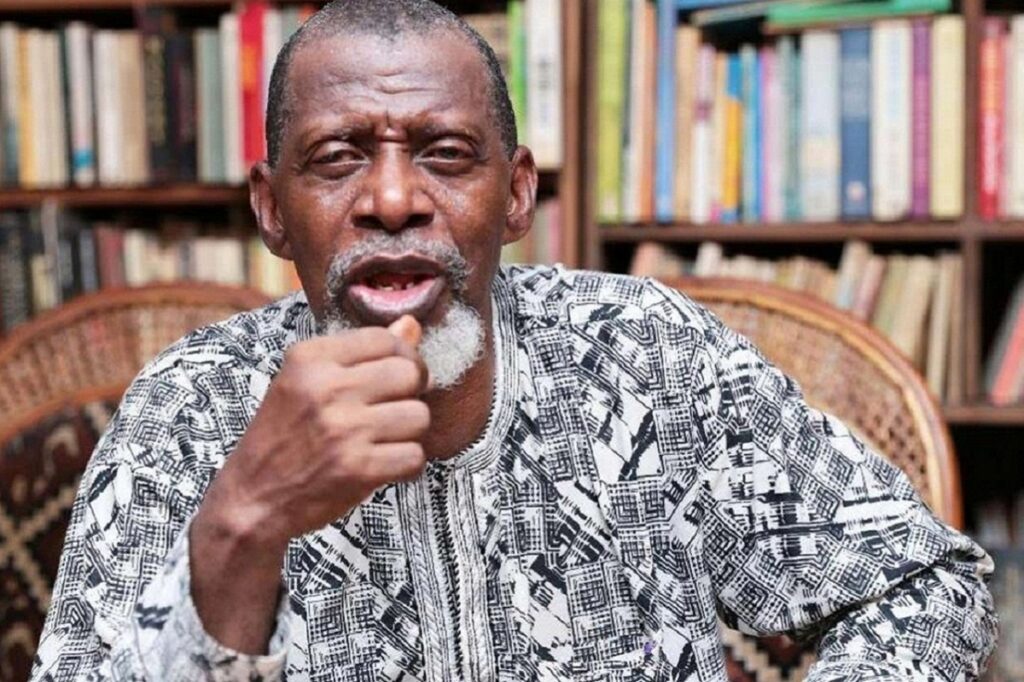
The Crisis of Identity in Journalism
A key issue confronting Nigerian journalism is the conflict between personal and professional identities. Kadaria Ahmed, Chief Executive Officer of RadioNow 95.3FM, observed, “We increasingly lack the courage to present ourselves and our righteousness in kind of believing that we know what is right.” This crisis of identity reflects broader societal tensions, where personal biases often overshadow journalistic integrity.
Traditional journalistic practices included mechanisms to mitigate bias, such as editorial oversight and established ethical guidelines. However, the rise of social media has eroded these safeguards. “Social media then becomes dangerous because everybody is creating and those gatekeepers don’t exist,” Ahmed noted. This democratization of content creation has led to an influx of unchecked information and misinformation, complicating efforts to maintain journalistic standards.
The Paradox of Trust and Funding
The financial realities of media production further exacerbate the crisis. “The issue of trust is now a currency. If you’re running a media house, the more trust you can gain from people based on the work you’re doing, the more likely you are to do well,” Ahmed explained. Trust is crucial for the success of media organizations, but building and maintaining this trust is costly.
“Media is expensive, and to do the kind of media that gets people to trust you costs money,” she added. This financial dependency creates a paradox: the very funding needed to sustain quality journalism often comes with conditions that can compromise editorial independence. “The biggest challenge right now facing media is two-fold. It’s that of essentially building trust, but then doing the sort of journalism that generates trust when the sources of your funding often tamper with the work you do.”
This tension between financial support and editorial integrity is exemplified by references to influential figures and organizations whose agendas may not align with public interest. “The Elon Musks of this world, the rich people, they have an agenda which has no bearing on what is right for the community,” Ahmed noted, highlighting the potential conflicts of interest inherent in media funding.
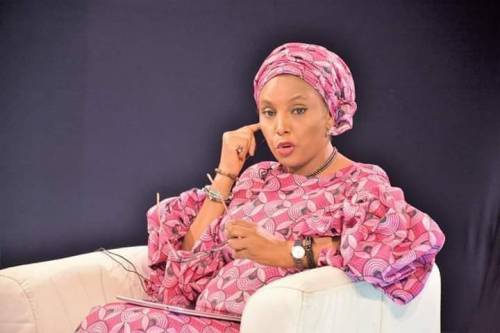
The Impact of Misinformation and Manipulation
The dangers of misinformation and manipulation are starkly illustrated by George Orwell’s dystopian vision. “Make people hate each other. Make everyone pick a side, tribal, make it where even truth and facts can be disputed,” Orwell wrote in 1984. This manipulation of truth, Ahmed argued, is a deliberate strategy to fragment society and undermine collective action. “We are being controlled by people who don’t want us to mobilize,” Ahmed warned.
This manipulation stymies efforts to address pressing societal issues and perpetuates divisions. “The truth is that media is expensive. And to do the kind of media that gets people to trust you costs money,” she reiterated, emphasizing the challenge of balancing financial realities with the need for credible journalism.
Lady Ejiro Umukoro, Executive Director of LightRay! Media, shared her insights on the challenges faced by journalists in maintaining the integrity of their work. She highlighted the complexities surrounding the concept of truth and the importance of presenting balanced and fair reporting. “Truth is not manipulated. There may be many truths. In other words, there may be different sides to an issue,” Umukoro stated. She referenced the Okwama tragedy to illustrate her point, explaining how the popular narrative initially blamed the Okwama people. However, further investigative journalism revealed that this narrative was incorrectly promoted by state actors to deflect accountability.
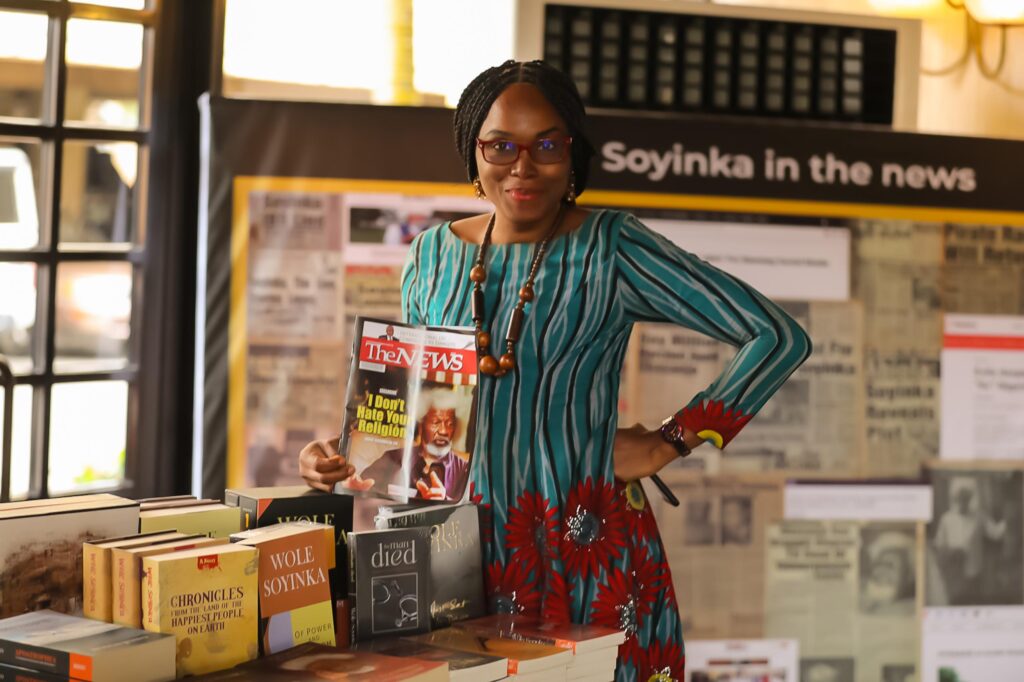
“The popular narrative in the media is that it was the Okwama people. But further investigative journalism has come to reveal that was a narrative that was wrongly perpetrated into the public spaces that form public opinion and projection and perception of the people of Okwama,” she explained. “Journalists at that point in time shouldn’t have simply run with a narrative that was either propagated by the army or the state government or other state actors who were working behind the scenes, who just wanted to not be held accountable for the ills that were committed.”
Umukoro emphasized the importance of recognizing multiple perspectives in a story. “As a people, we want to know that there are many sides of the story. And that’s why we say there are many truths. But when you now take one aspect of a story and then manipulate it into a propaganda machine or narrative with the aim to cause harm, with the aim to mislead, with the aim to actually garner more attention and favorable consideration for you, negative to the other person, that becomes a problem.”
She cautioned against the use of propaganda and stressed the need for fairness and balanced reporting. “You don’t want to put yourself in a situation like that, instead we all need to be deliberate as a decision to avoid them because it’s a tool of propaganda. So as journalists, the nature of journalism demands accurate, fair and balanced reporting. You have to be careful how you frame your headline in a way that it does not mislead a reader from thinking you’ve already taken a position.”
Umukoro urged journalists to ensure that their headlines and news reports accurately reflect the entirety of the story. “Instead, your headline should reflect the totality of the story in a way that it’s captured to reflect that. This is the key issue here. The entire news report should really reflect exactly what the headline states. Not otherwise, not misleading, not misinforming, and not with a goal to malign or cause more harm.”
Umukoro’s remarks further highlighted the critical role of journalists in upholding the principles of truth, facts, fairness, and balance in their reporting, ensuring that the media remains a trusted source of information for the public.
The Human Cost of Bias and Misinformation
The human cost of this crisis is profound. In a country like Nigeria, where the media plays a critical role in shaping public opinion and policy, biased and unreliable reporting can have devastating consequences. The rise of social media as a primary news source has led to the spread of misinformation, exacerbating tensions and conflicts.
“This manipulation of media narratives hinders collective action and societal progress, leaving the public vulnerable to exploitation and misinformation. We are being controlled by people who don’t want us to mobilize,” Ahmed warned. This crisis extends beyond the media itself, impacting the broader society. This manipulation of media narratives hinders collective action and societal progress, leaving the public vulnerable to exploitation and misinformation.
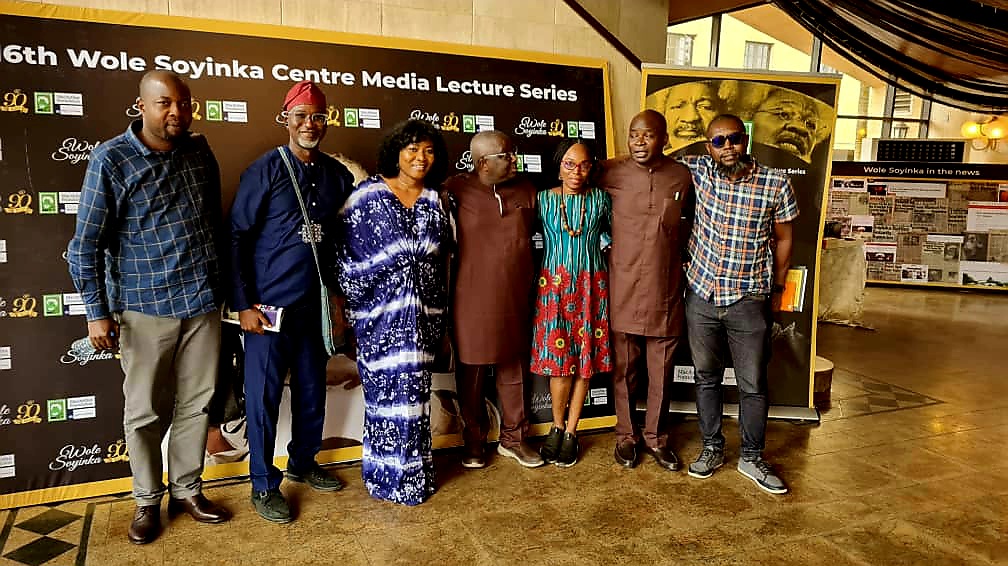
“To think of it, dearly, we are encountering a generation of young gods out there to change the world and to omit the sheer homework of class, tradition, and economic modernities,” Ofeimun noted. This new generation faces the daunting task of navigating a landscape where “individual success and communal salvation have been tampered with” he added.
Umukoro, emphasized the importance of journalists being aware of these influences and their impact on media integrity and public trust. “Media is such that it deals with a lot of other external forces, from the media owners to other stakeholders behind the scenes, political interferences, to their own personal values and biases and prejudices, as well as factors that have to do with regards to their role as gatekeepers in terms of also setting the agenda and in framing public opinion,” Umukoro explained. “When the media does not inform it’s audience with the right information and data they can arm themselves with, and does not inspire faith in their inherent ability to make long term collective decisions now, it is easier for other external forces powered by digital and social media to destabilize them through series of echo chambers from achieving desirable outcomes for the public good.”
She stressed the necessity for journalists to recognize these external forces and their indirect influence on the media. “When journalists understand that these external forces have a way of indirectly influencing them because of the structural nature of how media operates, being aware that these external influences will come to play is the first kind of wisdom a journalist must have and develop. When you’re able to do that, when writing, even you will begin to see within your writing your own biases filtered through. Your own fears will filter through. So you must always check yourself as you write a story or as you cover it.”
Umukoro highlighted the critical role of journalists as gatekeepers and agenda-setters, noting the challenges posed by organizational policies and politics. “In the area of gatekeeping, we only give out that story or angle that we want to give out based on the in-house style of media organization and the policy that drives it and their own kind of politics that are at play. Whether we like it or not, we need to understand that these things are at play and it’s our responsibility to diminish them to the barest minimum.”
She underscored the essential nature of public trust in media, particularly news media. “Public trust is held. And without public trust, media does not exist. Especially, specifically, news media does not exist. It will become any other pandering content, information, dissemination channel or platform. It is no longer the news media as we know it. We are now in the Age of Malicious Propaganda with a singular motive: money. Revenue. Income.”
Umukoro also addressed the potential conflicts arising from personal biases and connections. “We have to be very careful about all of this because our religious upbringing, our personal values and systems, our policies that we drive. One of the important roles of media is to advocate for policy drive. So if you’re going to be advocating for policy drive and you’re influenced by your own political leanings or your own political preferences and personal choices, or because somebody is your friend, right? Or you have connections to this or you are in need of something in return from somebody else. And so you pander to projecting them more and giving them importance and significance in your gatekeeping, framing and in your agenda setting, it is important to ask ourselves if we are compromising?”
Umukoro urged journalists to manage these influences carefully to maintain the integrity of information dissemination. “So we want to be very careful how we also manage all of this information dissemination and not become people who are simply information propagators.” Her insights serve as a crucial reminder of the challenges faced by journalists and the need to uphold the highest standards of integrity and accountability in the media industry.
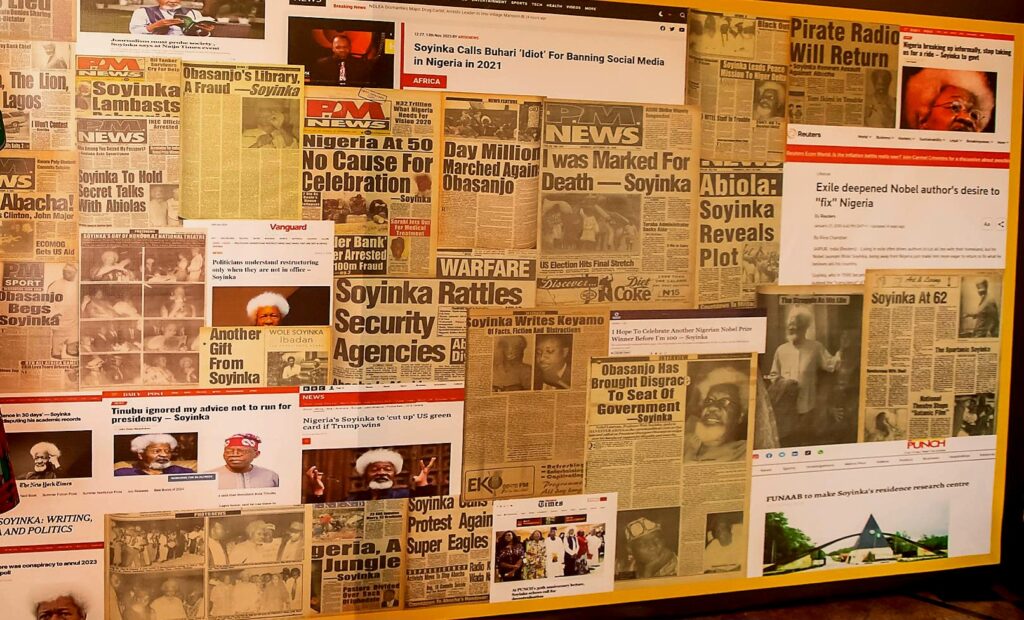
The Future of Nigerian Journalism
Umukoro stressed the critical role of journalists in maintaining truth and integrity in their work. According to Umukoro, the Nigerian constitution empowers journalists to use their freedom of expression to hold the government accountable. She highlighted the importance of understanding this empowerment, particularly sections 22 and 39 of the Nigerian constitution, which affirm the media’s role in shaping public opinion and acting as a watchdog.
Umukoro stated, “To be able to uphold the principle of truth and integrity in your work as a journalist, first and foremost you must understand that the law, the constitution, and in this context the Nigerian constitution in section 22 actually empowers you as a journalist to be able to use your freedom of expression in line with section 39 to hold government accountable.”
She further stressed that the unique responsibility of journalists sets them apart from other content creators. “If you’re going to hold government accountable, it means because of the important role that the media plays in shaping public opinion and as a watchdog, you cannot compromise on the principles of truth and integrity. That is what distinguishes a journalist from a blogger and from other content creators of different types. Even though Journalism requires you creating content, the type of content you create is for public interest.”
Umukoro underscored the essential attributes of journalistic content: truth, fact, balance, fairness, and accuracy. She explained, “Because the public interest depends on your ability to tell truth, present fact, you are unbiased, you are balanced, you are fair and you are accurate. That’s what makes it distinguished from any other kind of information, communication or content out there.”
Drawing attention to the broader societal role of journalists, Umukoro described them as part of the “four estates” of democracy. “Journalists must understand that they are part of a 4-realm, which is called the four estates. We are the members of the fourth of that estate. The first is executive. The second estate is the legislator. The third of that estate is the judiciary. And the fourth of that estate is the journalist, that is the media.”
She gave a powerful reminder of the ethical standards journalists must uphold: “You cannot go into the space of media and think you are just doing public relations or advertising or propaganda. You cannot be caught doing that because there’s no room for any other thing except truth, accountability, integrity, and accuracy in what you put out. If the information you’re about to put out is not verified, you cannot justify it, and it’s going to cause public harm, you do not have any morality or ethical right to publish the story.”
As Nigeria faces complex socio-political challenges, the media’s role as a truth-teller and public watchdog is more critical than ever. Journalists must navigate the intricate interplay of personal identity, financial pressures, and professional ethics while striving to provide accurate and unbiased reporting.
The insights from these speakers underscore the necessity of a resilient and independent media that can uphold the principles of truth and integrity amidst a landscape rife with biases and external pressures. The future of Nigerian journalism hinges on its ability to reconcile these challenges, preserving the legacy of storytelling and maintaining a steadfast commitment to the truth.
In the end, the quest for authentic journalism is not just about reporting facts but about fostering a deeper understanding of our shared human experience. It is a call to action for journalists to embrace their role as custodians of truth, navigating the complexities of identity, bias, and funding with courage and integrity.





Comments